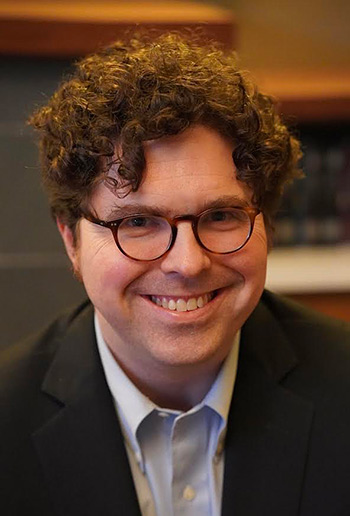By Gwyneth K. Shaw

Professor Andrew Bradt was recently appointed Associate Reporter to the Judicial Conference Advisory Committee on Civil Rules by U.S. Chief Justice John Roberts for a five-year term beginning Jan. 1. It’s a prestigious role for the renowned civil procedure scholar, and an opportunity to help shape the next evolution of the Federal Rules of Civil Procedure, which govern non-criminal proceedings in U.S. district courts.
“I was overwhelmed by the news, in part because it came as a surprise. But I’m thrilled and humbled to have the opportunity to serve the judiciary and the public,” Bradt says. “For a proceduralist, it’s really like manna from heaven to be on the ground of the rulemaking process. The chance to collaborate with such an incredible committee on this important work is irresistible.”
Bradt, who joined Berkeley Law’s faculty in 2012, is also the associate dean overseeing the J.D. curriculum and teaching as well as the faculty director of the school’s Civil Justice Research Initiative. In addition to being a celebrated scholar — with particular expertise in the burgeoning field of multidistrict litigation — Bradt won Berkeley Law’s top teaching accolade in 2019 and a UC Berkeley Distinguished Teaching Award in 2022.
“It is a tremendous honor to be chosen as the Associate Reporter to the Judicial Conference Advisory Committee on Civil Rules and I cannot think of anyone more deserving than Andrew Bradt,” Berkeley Law Dean Erwin Chemerinsky says. “I know he will make a huge contribution and that this work will further enhance his excellence in the classroom and as a scholar.”
Empowered by Congress to make policy for the federal judicial system, the Judicial Conference of the United States oversees a series of committees stacked with judges, lawyers, and academics to help guide any necessary changes. The Committee on Rules of Practice and Procedure, established by the Supreme Court in 1935 to draft the first Federal Rules of Civil Procedure, is now typically referred to as the “Standing Committee” and includes divisions overseeing rules for appellate, bankruptcy, criminal procedure, and evidence, as well as the civil branch.
The reporter and associate reporter positions are typically held by law professors considered leading experts in their field. They help research, suggest, and draft potential rules changes, and help keep track of public comment and other materials documenting the committee’s work.
Professor Jonah Gelbach, one of Bradt’s colleagues in the civil procedure field, says he’ll be an excellent addition to the committee as it navigates current debates over where rules changes or additions might be needed.
“Andrew Bradt’s intellectual heft and exquisite practical sense make him an unbeatable choice for this foundational role in our procedural infrastructure,” he says.
Bradt discusses his new role — and explains why the committee’s work is so important — below.
Q: What does an associate reporter do, and why is it an important job?
Bradt: The reporters serve the committee by analyzing possible amendments to the rules, writing drafts of proposed rule changes for committee deliberation, and develop the materials reporting the committee’s progress to the judiciary and the public. The reporters also review and summarize public comments received in response to proposed rulemaking. UC College of the Law, San Francisco Professor Richard Marcus (Berkeley Law ’72), whom I admire enormously, will become the reporter after serving as associate reporter for 26 years.
I’m so thrilled to work closely with him and Michigan Professor Ed Cooper, who has been the reporter for the last three decades. Together, Rick and Ed have steered the ship wonderfully and I have so much to learn from them.
Q: How does the committee work? What’s the process for raising a potential rules change, and pushing it forward?
Bradt: The Federal Rules of Civil Procedure, which were first promulgated in 1938, are one of the great success stories of American litigation. But they cannot be static. It’s the committee’s job to ensure that the rules keep up with changes in the law and the world more generally.
Ideas for new rules or amendments can come from anywhere — lawyers, scholars, even the general public. It’s the rules committee’s job to decide whether to consider any proposed changes and draft amendments. If the committee chooses to go forward, it must seek approval from the Standing Committee on Practice and Procedure, which oversees all of the rules committees, to publish a draft for public comment.
After the comment period, the rules committee decides whether to modify and adopt the proposal and submits it to the Standing Committee. If that committee agrees, the proposal goes to the Supreme Court for consideration and approval, and then to the Congress for its approval.
Q: Why is it important that the rules be revised and updated at regular intervals? Is there an example of something that’s changed in civil procedure since you began researching in this area?
Bradt: The rules have to keep up with what courts and lawyers actually do or they will lose their efficacy. One recurring example is discovery, and the explosion of e-discovery in recent decades — a process that continues to evolve as new technology develops. Another example is thinking about what lessons we learned from adapting procedure during the pandemic: what worked well and ought to be part of procedure going forward, and what experiments didn’t work?
Q: What else are you excited about in this new position?
Bradt: It’s just a great honor to be a part of this reason-driven, bipartisan, and deliberative process, which affects all federal civil litigants, and to work with the outstanding judges and lawyers who devote their time to this enterprise. And many great civil procedure scholars have served in this role — it’s daunting to be on that list, but I will give it the old college try!